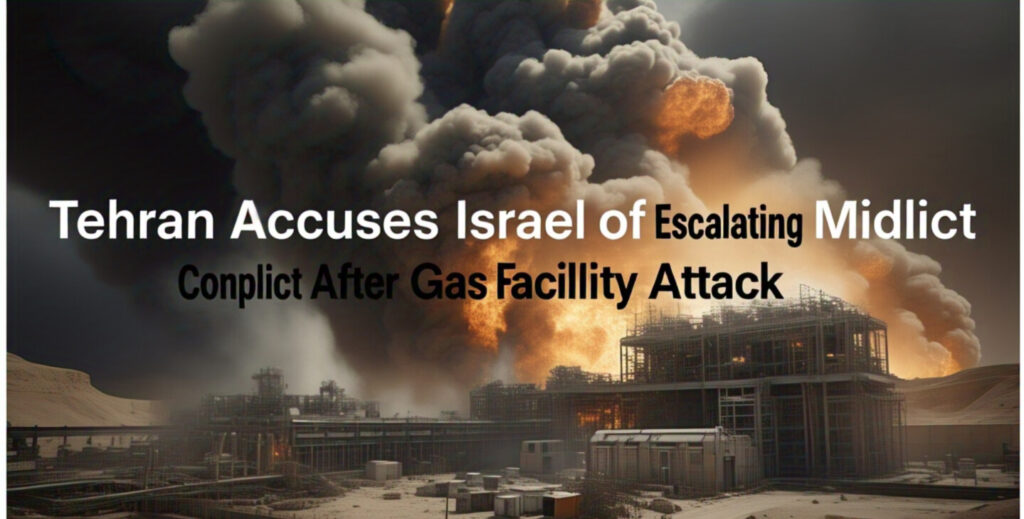Tehran Accuses Israel of Escalating Conflict in Middle East After Iranian Gas Facility Attack
In a rapidly intensifying regional saga, Tehran accuses Israel of launching a drone strike on a vital Iranian gas facility, inflaming already strained geopolitical tensions in the Middle East. The incident, which occurred in Asaluyeh, a strategic port city in southern Iran, is now being described by Iranian officials as a deliberate attempt to destabilize the region.
Tehran Accuses Israel of Provocation in Asaluyeh Attack
The alleged attack, executed via drone in the early hours of Sunday, caused minor structural damage and a brief blaze at one of Iran’s key gas export facilities. Iranian state media insists that preliminary intelligence supports the claim that Israeli operatives were behind the strike. Though Israel has neither confirmed nor denied involvement, its silence aligns with its policy of strategic ambiguity—a hallmark of its regional operations.
According to BBC World Service, unconfirmed reports from Western intelligence suggest Israeli involvement in what could be a covert campaign targeting Iran’s energy infrastructure.
Strategic Ambiguity: Israel’s Military Playbook Under Scrutiny
The phrase Tehran accuses Israel has now become a dominant thread in global headlines, highlighting how covert military posturing and technological warfare are reshaping Middle Eastern conflict dynamics. By refraining from official comment, Israel continues its strategy of deterrence without direct admission.
Security experts note that Israel’s increasing reliance on advanced drone warfare technology is part of a long-term strategy to curb Iran’s influence and capabilities in the region. Learn more about the evolution of these technologies in our Technology section.
Gas Facility Attack: Timeline and Impact
| Detail | Description |
|---|---|
| Location | Asaluyeh, Southern Iran |
| Date | June 15, 2025 |
| Facility Type | Natural Gas Facility |
| Casualties | None Reported |
| Alleged Perpetrator | Israel (unconfirmed) |
| Method of Attack | Drone Strike |
Geopolitical Fallout After Tehran Accuses Israel
As news spreads that Tehran accuses Israel of baiting a broader war, reaction from regional and international actors has been swift yet cautious. Iranian Foreign Minister Hossein Amir-Abdollahian issued a stern warning, stating Iran “reserves the right to respond decisively to any violation of its sovereignty.”
The IRGC (Islamic Revolutionary Guard Corps) is reportedly on high alert. Analysts fear the situation could derail upcoming nuclear diplomacy efforts, particularly Iran’s scheduled talks with global powers next month. Al Jazeera confirmed Tehran has filed a formal complaint with the United Nations Security Council.
What’s Next for the Iran-Israel Shadow War?
Experts like Michael Horowitz of Le Beck International argue that these types of covert Israeli attacks are aimed at disabling both infrastructure and confidence within the Iranian regime, especially amidst economic sanctions and internal unrest.
The phrase Tehran accuses Israel is more than political rhetoric—it raises legitimate concerns about an impending regional war, especially as Hezbollah and other Iranian-backed groups may retaliate independently.
Iranian Public and Media Reactions
Widespread protests, patriotic chants, and media coverage are dominating Iranian airwaves and social media platforms. Hashtags like #TehranResponse and #IranUnderAttack are trending on platforms such as X and Threads.
Coverage from Kashmir News Breaking section provides real-time updates about ongoing diplomatic dialogues and possible retaliation scenarios.
Consequences for Energy Stability and Global Markets
The escalation could disrupt not only regional peace but also global energy markets. Asaluyeh accounts for a major percentage of Iran’s LNG output, and any prolonged threat to the facility could spike gas prices globally.
Stay informed on this and similar global health and economic impacts by visiting our curated content at Kashmir News Health.
Conclusion: Heightened Risk Demands Global Engagement
As the world watches with bated breath, Tehran’s accusation against Israel serves as a potent reminder that the shadow war between these two nations has very real consequences. With Tehran accusing Israel of escalating armed conflict, the international community is pressed to act before the situation spirals into a full-blown regional war.
Visit the Kashmir News homepage for continuing coverage on this developing geopolitical story.
FAQs
What happened in the Asaluyeh gas facility incident?
A suspected drone strike targeted an Iranian gas facility in Asaluyeh. Iran blames Israel for the attack.
Why does Tehran accuse Israel?
Iran believes Israel is attempting to provoke broader conflict and disrupt its energy exports through covert operations.
Has Israel claimed responsibility?
No, Israel has neither confirmed nor denied involvement, maintaining its usual policy of strategic ambiguity.
What is the global reaction?
Countries and observers are calling for de-escalation while the UN examines Iran’s formal complaint.
What is strategic ambiguity?
It’s a policy of not confirming or denying involvement in military actions, commonly used by Israel.
Is the IRGC mobilizing for action?
Yes, reports suggest the IRGC has increased alertness following the attack.
How does this affect gas markets?
Potential instability in Iran’s gas production could lead to spikes in global LNG prices.
What other regions might be impacted?
Hezbollah in Lebanon, Houthis in Yemen, and other Iran-linked groups could respond, risking broader escalation.
How does this affect Iran’s nuclear deal?
The incident threatens ongoing diplomatic efforts regarding Iran’s nuclear program.
Where can I get real-time updates?
Check the Breaking News section of Kashmir News for live developments.
Will the UN intervene?
Iran has requested intervention, but no official steps have been announced yet.
Are there credible sources reporting this?
Yes, outlets including the New York Times and Hindustan Times are following the case.
Could war break out over this?
Analysts warn that unchecked escalation risks open conflict between Iran and Israel.
What’s next after Tehran accuses Israel?
A global diplomatic balancing act to prevent war while maintaining regional stability.


